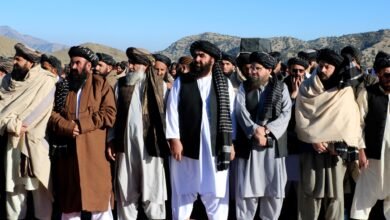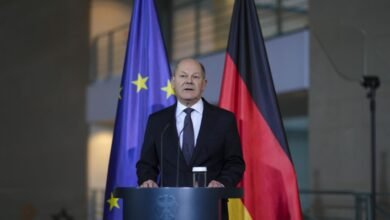Shuttered Turkish radio station denies licence was cancelled over the phrase ‘Armenian genocide’

Open Radio’s founder said that an on-air use of the phrase ‘Armenian genocide’ had been taken out of context.
One of the oldest radio channels in Turkey, Açık Radyo (Open Radio), whose license was revoked by the Turkish Radio and Television Supreme Council (RTÜK) a month before its 30th year on air, stopped its terrestrial programming on Wednesday.
Open Radio founder Ömer Madra told Euronews in an interview that despite speculation circulating online, the station’s license was revoked not because of the use of the phrase “Armenian genocide” but because the operators had failed to suspend their broadcast on five particular days the regulator had ordered them to.
Madra explained that he and his colleagues were not properly informed of the particular dates on which they were supposed to suspend their broadcast, so they continued as usual.
It was Madra who spoke the last words broadcast from the station:* “Open Radio will remain open to all sounds, colors and vibrations of the universe.”
Open Radio, which began broadcasting in 1995, was handed a fine of 280,000 Turkish lira (€7,500) and a five-day broadcast suspension after a broadcast on 24 April when a guest used the phrase “Armenian genocide” while discussing events commemorating the 1915-17 atrocity, which remains an extremely controversial subject in Turkey.
Madra told Euronews that following the sanction, they were not told the exact dates when they had to stop the broadcasting and did not receive the electronic notice regarding them due to software and technical issues.
The founder also underlined that RTÜK did not deem this explanation acceptable, and thus revoked the terrestrial broadcast license.
The a 79-year-old Madra described the last moments of the broadcast with a hint of sadness.
“There were 6 minutes left to switch off the broadcast,” he recalled. “However, since we could not raise 41 broadcasters to take part in the last broadcast, 41 people said only one word; ‘Hello’. We closed by saying ‘hello’ 41 times.”
On Thursday, October 17, the day after the license was revoked and the last broadcast was carried out, the station’s team arrived at work as if for another normal day. They switched on their computers and prepared the studio equipment as they did every day — but no broadcast could be transmitted.
Words taken out of context
Speaking to Euronews Turkish about the process leading up to the cancellation, Madra insisted that the phrase “Armenian genocide” in the broadcast on 24 April was taken out of context.
“On that day, in the section of Açık Gazete, our main news broadcast, in which Cengiz Akdar participated, an evaluation was made about the history of (Armenian genocide) commemorations and the point they had reached.
“The following was said: ‘While the commemoration is being held here under the protection of law enforcement, even (Armenian Prime Minister Nikol) Pashinyan did not utter the word ‘genocide’ today.'”
“The current attitudes of different political actors on the issue were mentioned and the following words were spoken: ‘It is the 109th anniversary of the deportations and massacres that took place in Armenian, that is, Ottoman lands, massacres that are called ‘genocide’. As you know, the Armenian genocide commemoration was banned this year as well’.”
Following the use of these phrases, RTÜK imposed the fine and suspension on the grounds of “inciting the society to hatred and hostility or creating feelings of hatred in the society,” in accordance with Turkish law.
Madra stated that they have not only appealed the fine but also begun to comply with it.
“We still have our receipt for the first instalment. However, since we did not receive an electronic notification on the dates of the broadcast suspension, we continued our broadcasts as usual.”
Stating that the process is being carried out as if the station does not care about the penalty imposed on them by, Madra said: “We sent a petition saying ‘give us a new date’, since the broadcast suspension dates could not reach due to the notification problem.”
“Although the text of the Supreme Council’s decision was opened in the notification sent electronically, the text indicating the closure dates could not be opened due to a software error in the electronic notification system. Therefore, since we were not aware (of the broadcast suspension dates), the decision could not be implemented.”
“On the other hand, when the fine was included in the decision, an application was made to RTÜK for payment and the first instalment was paid. They accepted this. We also received the receipt.”
Madra also said that the first broadcasting ban decision was not imposed on all of Açık Radyo’s programmes but only on the show that included the phrase “Armenian genocide” and the people involved with it.
Confusion and refusal
Explaining that RTÜK did not respond to their petition requesting a new date for the broadcast ban, Madra recalled that in July, RTÜK had in fact suspended the execution of the license cancellation.
“In the lawsuit we filed against the penalty decision, the 21st Administrative Court issued a stay of execution on the penalty until the administration’s defence was submitted. RTÜK also appealed to a higher court against the stay of execution decision, but this was rejected by the higher court. Consequently, RTÜK did not notify us on the license cancellation decision.”
But on October 8, 2024, the 21st Administrative Court re-evaluated the case and cancelled the stay.
“Before we could object to this, RTÜK immediately notified us of the decision to cancel the terrestrial broadcasting license it had previously taken and our license was cancelled,” Madra said.
The future of Open Radio
Madra says he and his colleagues are hopeful that the cancellation of their terrestrial broadcasting license will be “at least temporarily suspended”.
“We cannot say 100 percent, but legally this is a great possibility,” he said. “We can get our acquired rights back. However, in the opposite case, we cannot apply for the same terrestrial broadcasting license.”
“Since the FM band in Istanbul is very dense, no new license applications can be made. There are many companies that have not already been allocated a frequency and are waiting in line. In such a case, we would already be in the last place.”
While acknowledging that there is no clear timeline for the legal process, Madra still sounded hopeful.
“We hope to be back on air within a week to 10 days,” he said. “No one can be 100% sure. Even if we cannot go back to terrestrial broadcasting, in the worst-case scenario, we can continue with digital broadcasting within the same period of time, and it may even be just a few days before we get permission to switch to digital broadcasting.”
“Of course, we had planned all the preparations as of June. We have made a lot of preparations.”
Source link



